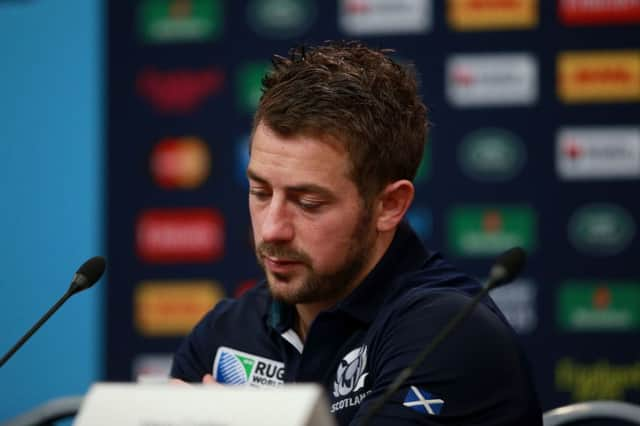Simon Taylor: Laidlaw and Cotter were winners after all


I have to admit, I did then have a glance at a few internet comments sections on Sunday night, usually a surefire way to decrease the half-life of your soul, and there was some solace, as a fan, to find that the majority of the world’s rugby public shared our dismay and confusion over Craig Joubert’s contested decisions.
But for the players there is no such facile source of consolation. You just wonder if, after big games, referees lie awake at night agonising over what they might have done differently as, for instance, the five or six players involved in that final decisive penalty incident will be this week? Given Joubert’s general demeanour, I doubt he will, and the manner in which he made his decisions and communicated them to the players was part of the problem. A Nigel Owens may or may not have made the same calls, but you imagine he would have had the good grace to either properly explain them or even apologise for any possible error immediately afterwards.
Advertisement
Hide AdAdvertisement
Hide AdAnyway, the issue has been done to death, and maybe we should all take a lead from Greig Laidlaw and Vern Cotter. They showed incredible restraint in their interviews at full-time. On the pitch, of course we want Scottish sport to be ruthless and clinical and this side have made huge strides in those areas, but off-field there is still a lot to be said for gentlemanly, measured behaviour.
Anyone who saw Mike Brown after the Wales v England game could only agree. I’m sure there are very few of us who could have remained as composed as Laidlaw and Cotter in those moments and their reaction allowed us a glimpse into the kind of character which lies behind Scotland’s recent improvement. Apart from refereeing decisions, the other hot topic is why we didn’t call something easier in that last line-out. My take on it is this: we had gone to the front on a four man line-out previously and had it picked off, which led to the Australian’s fifth try. So for this crucial throw, Scotland went to their “go-to” formation, a five man, with John Hardie at nine ready to secure the ball. When Ross Ford is on the field, Jonny Gray, heavily influenced by Victor Matfield, calls a lot of throw-catches to himself, with minimal movement. Ford’s throws are perfect for this as he puts a lot of shape on them, allowing Gray to wait until the ball leave his hands before going up.
Fraser Brown, who played well when he came on, throws slightly flatter, so Scotland then tend to go to more dummy movements to get into space.
Sure enough, Dave Denton found himself wide open but the throw was overcooked by just a few inches. The fact the catch would have been uncontested showed it wasn’t a bad call but you just wonder whether, given the situation and conditions, Scotland have a “must-win” lineout where the front jumper or even the prop stays on the deck and takes it directly from the hooker. You end up with a messy ruck on the five metre line, but you have the ball.
But it has been a long time since any Scotland team found itself in a situation where one decision has been important enough to merit such scrutiny. In fact, it seems pretty unreasonable to criticise any aspect of a performance like that, but this team have shown over the past few months that they deserve and expect to be held to a higher standard than any Scotland side of at least the past 15 years.
There were times during this game when you almost had to laugh at the very un-Scottish confidence, chutzpah and bouncebackability of these young players. Unfortunately enough for me, it’s not something I particularly identify with from my playing days, but here they were, in the biggest game of their lives, looking lucid, loose and playing out of their skins.
Given their own high standards, Scotland will be disappointed (again) with how they dealt with kick-offs. Australia had clearly glanced at a video of the Samoa game and had a bit of a lightbulb moment. They hardly kicked to the same place twice and never let our pods settle into a rhythm; sometimes kicking to regather, sometimes going deep. Then, when we did catch it cleanly, our exit was often untidy and immediately the Wallabies were on the front foot. The disparity between the excellence of our scrum and lineout and the nerviness of the third set-piece is hard to understand. And I still think we are too conservative with our own kicks, almost every one being sent long right and giving Australia an easy chance to clear. Even in the 79th minute, when recovering the ball seemed to be the only available option, we didn’t kick to compete.
But again, who am I, or any of us, to pass comment? This extremely talented group of players have gone some way to putting Scottish rugby back on the map in this World Cup and it is a long time since cliches like “fine margins” have been used about Scotland in a game of this magnitude. They have made up a lot of ground very quickly, and the fine margins will come.